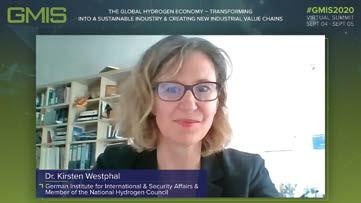
4 minute read
Panel: The Global Hydrogen Economy – Transforming into a Sustainable Industry and Creating New Industrial Value Chains
DAY TWO: Panel Discussion
WATCH FULL VIDEO
WATCH HIGHLIGHTS
DR. KIRSTEN WESTPHAL German Institute for International and Security Affairs and Member of the National Hydrogen Council
ARMIN SCHNETTLER
CEO New Energy Business, Siemens Energy & President, VDE
DANIEL MILLS
Product Manager Hydrogen and Clean Energy, Linde Australia


The push to develop hydrogen as a significant energy source is likely to disrupt and reshape global energy value chains and create opportunities for more countries to play a significant role. These were the key learnings from a panel discussion on the challenges of developing a global market for hydrogen, which was moderated by Holger Lösch, Deputy Director General of the Federation of German Industries (BDI).
Hydrogen has often been referred to as “the oil of the future”, said Dr. Kirsten Westphal of the German Institute for International and Security Affairs and a Member of the National Hydrogen Council, but there is still a long way to go before we see a global hydrogen market comparable to the existing oil market. “There are more options with hydrogen and it’s really also more about who you partner and team up with and this is very important from the geopolitical and geoeconomic point of view,” said Westphal. “It’s really about defining joint ventures across the whole value chain. The oil system is very different. It’s basically dictated by geology and then infrastructure. Of course, we managed to build up a global oil trading system but this took a long time. My hope is that a similar system will develop for hydrogen, but it will be very different.”
Armin Schnettler, CEO New Energy Business, Siemens Energy & President, VDE, said it was vital to bring the cost of hydrogen production down in order to transform and decarbonise existing fossil fuel-based industries.



“It is very important to drive costs down and the cost for hydrogen or green hydrogen strongly depends on costs for renewable electricity,” said Schnettler. “This is something we are very focused on to help existing industry transform and reduce their CO2 footprint. And at the same time, we’re moving towards the green hydrogen opportunity by investing in technology development, but also developing renewable electricity in countries with excellent conditions. In the long run I do see green hydrogen as the key opportunity, the key market.”
Daniel Mills, Product Manager Hydrogen and Clean Energy at Linde Australia (BOC), said that while renewable energy is seeing phenomenal growth and gaining a larger share of the energy mix, the electricity is mostly produced in the middle of the day when demand is at its lowest. However, he said this provided an opportunity to use any surplus electricity for hydrogen production.
“We’re seeing extremely high peaking power prices in the afternoon as a major challenge to industry and particularly to the manufacturing industries,” said Mills. “What we’d love to see is hydrogen being used as a storage mechanism to help shift that great peak of renewables we see in the middle of the day to when industry and households are really looking for that power.”
DANIEL MILLS
Product Manager Hydrogen and Clean Energy, Linde Australia

DR. KIRSTEN WESTPHAL
German Institute for International and Security Affairs and Member of the National Hydrogen Council
ARMIN SCHNETTLER
CEO New Energy Business, Siemens Energy & President, VDE
It’s really about defining joint ventures across the whole value chain. The oil system is very different. It’s basically dictated by geology and then infrastructure. Of course, we managed to build up a global oil trading system but this took a long time. My hope is that a similar system will develop for hydrogen, but it will be very different
This is something we are very focused on to help existing industry transform and reduce their CO2 footprint. And at the same time, we’re moving towards the green hydrogen opportunity by investing in technology development, but also developing renewable electricity in countries with excellent conditions We’re seeing extremely high peaking power prices in the afternoon as a major challenge to industry and particularly to the manufacturing industries”
SATURDAY, SEPTEMBER 05, 2020
#GMIS2020 VIRTUAL SUMMIT CLOSING CEREMONY














